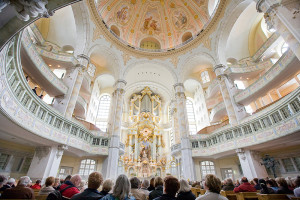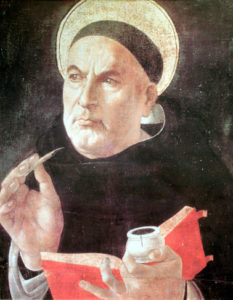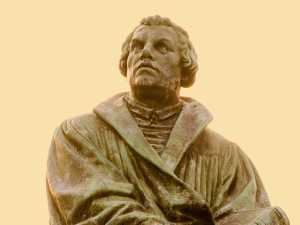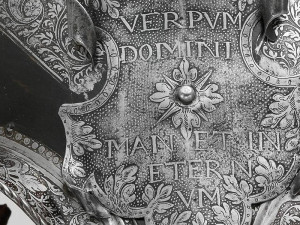Great Stuff found over on LutheranReformation by Rev. A. Brian Flamme.
 Books are like buildings. Think of them as constructed with words and thoughts rather than with bricks and mortar. The author lays one idea upon the other to form sentences, paragraphs, chapters, and conclusions. To be sure, not all books have the same architecture. Some are beautiful in their eloquence while others are simple and utilitarian, like the difference between Dicken’s A Tale of Two Cities and the driver’s manual gathering dust in your glove compartment.
Books are like buildings. Think of them as constructed with words and thoughts rather than with bricks and mortar. The author lays one idea upon the other to form sentences, paragraphs, chapters, and conclusions. To be sure, not all books have the same architecture. Some are beautiful in their eloquence while others are simple and utilitarian, like the difference between Dicken’s A Tale of Two Cities and the driver’s manual gathering dust in your glove compartment.
 Someone once remarked that Thomas Aquinas’ (1225-1274) theological masterpiece, the Summa Theologica, is like a great Gothic cathedral of the mind written to the praise and glory of God. It’s true. As you pore over the hundreds of pages of Christian doctrine, you get the sense of walking through the nave of one of Europe’s massive medieval sanctuaries. You can’t help but marvel at the precision of the arguments, the depth of understanding, and the beauty of God’s revelation. After spending a few hours meditating on the dear Doctor’s questions, you realize that it’s wondrous to take in the sights, but it’s also exhausting. It’s hard mental work. Eventually you have to put the tomes down and move on to something less speculative and metaphysical. And just think, for Thomas this was a mere summary, a primer in the basics of what the Christian should know!
Someone once remarked that Thomas Aquinas’ (1225-1274) theological masterpiece, the Summa Theologica, is like a great Gothic cathedral of the mind written to the praise and glory of God. It’s true. As you pore over the hundreds of pages of Christian doctrine, you get the sense of walking through the nave of one of Europe’s massive medieval sanctuaries. You can’t help but marvel at the precision of the arguments, the depth of understanding, and the beauty of God’s revelation. After spending a few hours meditating on the dear Doctor’s questions, you realize that it’s wondrous to take in the sights, but it’s also exhausting. It’s hard mental work. Eventually you have to put the tomes down and move on to something less speculative and metaphysical. And just think, for Thomas this was a mere summary, a primer in the basics of what the Christian should know!
Now think about Luther’s Small Catechism. It’s not massive. It’s short and to the point. I know plenty of children that have committed its words to heart. Rather than resembling a towering cathedral, it reminds you of a home. It’s where you wake up, eat, pray, and go to bed. The expectation isn’t that you’ll spend a few hours of study there before exhaustion forces you to walk away. It’s where you live. It’s where you find protection, contentment, and rest.
When you walk through the front door, you’re not overcome the theological heights that men can reach. Instead you see a living room where children are gathered around a father reciting the Scriptures.
 The Catechism’s theological content is presented “as the head of the family should teach them in a simple way to his household.”[i] As the household is built up on God’s Word, you begin to learn that the Christian’s “delight is in the law of the Lord, and on his law he meditates day and night” (Psalm 1:2).
The Catechism’s theological content is presented “as the head of the family should teach them in a simple way to his household.”[i] As the household is built up on God’s Word, you begin to learn that the Christian’s “delight is in the law of the Lord, and on his law he meditates day and night” (Psalm 1:2).
Don’t let the humble looks deceive you. This is the daily bread that sustains Christian faith. It fights back against ignorance, despondency, and the terrors that bubble up from the devil’s lies. Luther writes,
“Nothing is so powerfully effective against the devil, the world, the flesh, and all evil thoughts as to occupy one’s self with God’s Word, to speak about it and meditate upon it… For this reason alone you should gladly read, recite, ponder, and practice the catechism, even if the only advantage and benefit you obtain from it is to drive away the devil and evil thoughts. For he cannot bear to hear God’s Word.”[ii]
What comfort! The catechism is a home for the Christian, but against the devil it stands as an impenetrable fortress and castle. You won’t find lies in this house, just the truth of Christ’s Word.
Looking at the foundation of this house, you see that it’s made up of three parts: the Ten Commandments, the Apostle’s Creed, and the Lord’s Prayer. When Luther settled on these teachings from the Scriptures, it was nothing revolutionary. They had been part of the Church’s catechism for a long time.[iii] In that sense, Luther’s choice was catholic (or universal in the Christian Church) and in the long tradition of aids published for the sake of Christian piety. What was significantly different was the order.
 Remember Thomas’ Summa? It turns out he wrote a summary of the summary which he called the Compendium of Theology. It was a close as the medieval doctor came to a catechism. Still, it’s important to see how he organized the theological content in the order of the virtues of faith, hope, and love as found in 1 Corinthians 13:13. Thomas writes,
Remember Thomas’ Summa? It turns out he wrote a summary of the summary which he called the Compendium of Theology. It was a close as the medieval doctor came to a catechism. Still, it’s important to see how he organized the theological content in the order of the virtues of faith, hope, and love as found in 1 Corinthians 13:13. Thomas writes,
“My whole endeavor in the present work is taken up with these three virtues. I shall treat first of faith, then of hope, and lastly of charity. This is the Apostle’s arrangement which, for that matter, right reason imposes. Love cannot be rightly ordered unless the proper goal of our hope is established, nor can there be any hope if knowledge of the truth is lacking. Therefore, the first thing necessary is faith, by which you may come to a knowledge of the truth. Secondly, hope is necessary, that your intention may be fixed on the right end. Thirdly, love is necessary, that your affections may be perfectly put in order.”[iv]
Dr. Charles Arand shows us how this focus on the virtues leads to the order of Creed, Lord’s Prayer, and Ten Commandments in the pre-Reformation catechisms. “The faith expressed in the Creed laid the foundation for the Christian life. It outlined the central acts of God upon which the Christian life is based. As the second section of the catechism, the Lord’s Prayer was ranked equal in importance with the Creed. It contained everything that a Christian should seek from God. Finally, the Ten Commandments served as the moral norm for the Christian life.”[v]
So think of it this way: the early catechisms wanted you have to know the truth to desire the right things so that you can do the things required to achieve those ends. At the end of the day, you’re left looking at the works of your hands.
 Luther switches it up. He sees men differently than the medieval schoolmen and papistic theologians. Man isn’t going to tend toward the truth naturally. Man is sick. His mind and body are corrupted by sin. St. Paul writes, “The natural person does not accept the things of the Spirit of God, for they are folly to him, and he is not able to understand them because they are spiritually discerned” ([vi]
Luther switches it up. He sees men differently than the medieval schoolmen and papistic theologians. Man isn’t going to tend toward the truth naturally. Man is sick. His mind and body are corrupted by sin. St. Paul writes, “The natural person does not accept the things of the Spirit of God, for they are folly to him, and he is not able to understand them because they are spiritually discerned” ([vi]
This is why the order was changed from truth-ends-action to law-gospel-faith. In the Catechisms we find a total reformation of how the Christian approaches the Holy Scriptures, as sinners who need Jesus’ blood and righteousness.
 What about the Commandments? Don’t they do more than diagnose and kill the sinner? Of course. That’s why Luther admonishes Christians to recite them every day, so that the Christian’s love toward God and his neighbor might continually be shaped and molded by the Word. You see, Luther always presupposes faith in Christ for the positive requirement of the Commandments to be kept. You can’t deny it when you read through the Large Catechism’s lengthy explanations which are nothing more than Luther’s own sermons preached to a Christian congregation. Did you know that the longest portion of the Large Catechism is dedicated to the Ten Commandments? They are precious treasures in the hands of the man who fears, loves, and trusts in the God who justifies him by grace.
What about the Commandments? Don’t they do more than diagnose and kill the sinner? Of course. That’s why Luther admonishes Christians to recite them every day, so that the Christian’s love toward God and his neighbor might continually be shaped and molded by the Word. You see, Luther always presupposes faith in Christ for the positive requirement of the Commandments to be kept. You can’t deny it when you read through the Large Catechism’s lengthy explanations which are nothing more than Luther’s own sermons preached to a Christian congregation. Did you know that the longest portion of the Large Catechism is dedicated to the Ten Commandments? They are precious treasures in the hands of the man who fears, loves, and trusts in the God who justifies him by grace.
There are three other chief parts which you’ve also learned about in Catechism class. These are Christ’s institutions, his sacraments by which the gifts of God’s favor give us faith and comfort in this life. If the Commandments, Creed, and Lord’s Prayer are the foundation, then this is the structure, the façade that holds up the rest of the house. Luther therefore points our eyes to Jesus’ very words in the Bible to learn about Baptism, the Supper, and the Office of the Keys. Having heard the Creed, the student of the Catechism discovers that the treasure chest of God’s Word has been kicked open.[vii] Now he sees Jesus’ preaching, Baptism, and Supper not as works to earn God’s favor, but as the gifts to create and sustain saving faith.
 Dear Christian, when you open Luther’s Catechisms, you’re coming home. You’re presented the Scriptures that admonish and comfort, that humble and exult, that kill and give life. This isn’t theology for an academic elite versed in philosophy and metaphysics. It’s theology for sinners. It’s theology for fathers, mothers, husbands, wives, masters, workers, and children. Until the day we die, we need to remember our sorry sinful state, God’s great love purchased and won through the death of Jesus, and the joy of lifting our petitions to our Father as we fully trust in his mercy. We’re all but children in our Father’s house. Luther writes,
Dear Christian, when you open Luther’s Catechisms, you’re coming home. You’re presented the Scriptures that admonish and comfort, that humble and exult, that kill and give life. This isn’t theology for an academic elite versed in philosophy and metaphysics. It’s theology for sinners. It’s theology for fathers, mothers, husbands, wives, masters, workers, and children. Until the day we die, we need to remember our sorry sinful state, God’s great love purchased and won through the death of Jesus, and the joy of lifting our petitions to our Father as we fully trust in his mercy. We’re all but children in our Father’s house. Luther writes,
“I am also a doctor and a preacher, just as learned and experienced as all of them who are so high and mighty. Nevertheless, each morning, and whenever else I have time, I do as a child who is being taught the catechism and I read and recite word for word the Lord’s prayer, the Ten Commandments, and Creed, the Psalms, etc. I must still read and study the catechism daily, and yet I cannot master it as I wish, but must remain a child and pupil of the catechism – and I also do so gladly.”[viii]